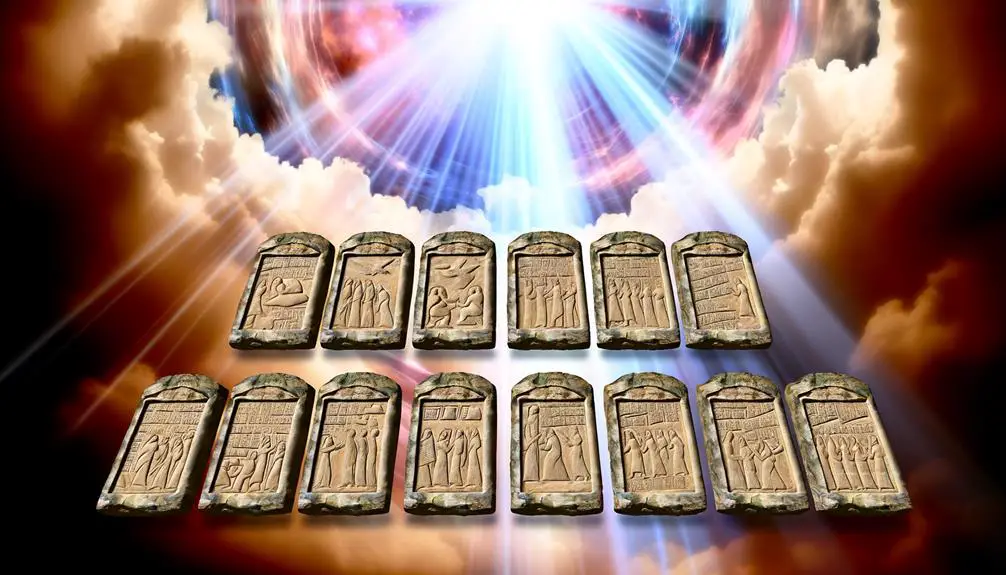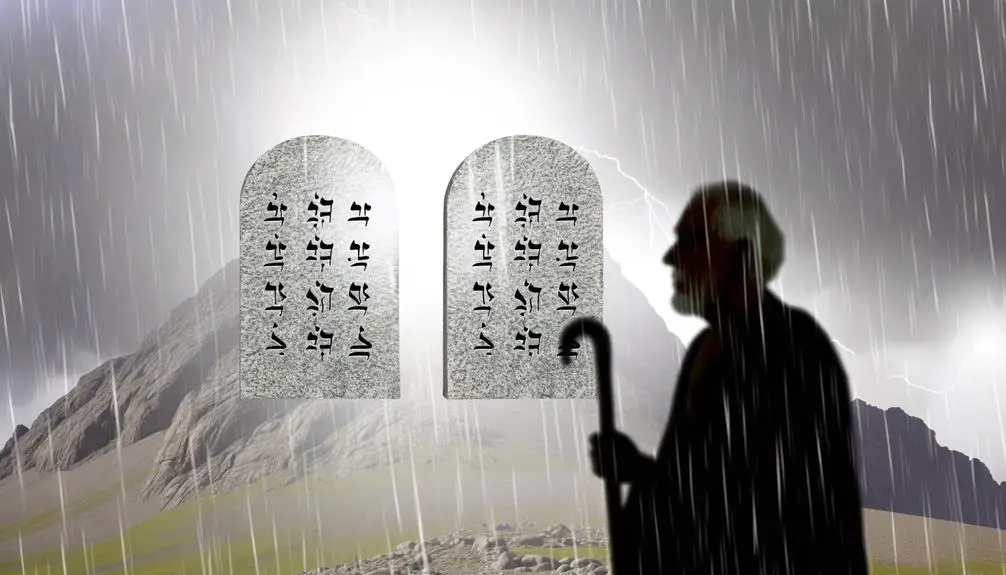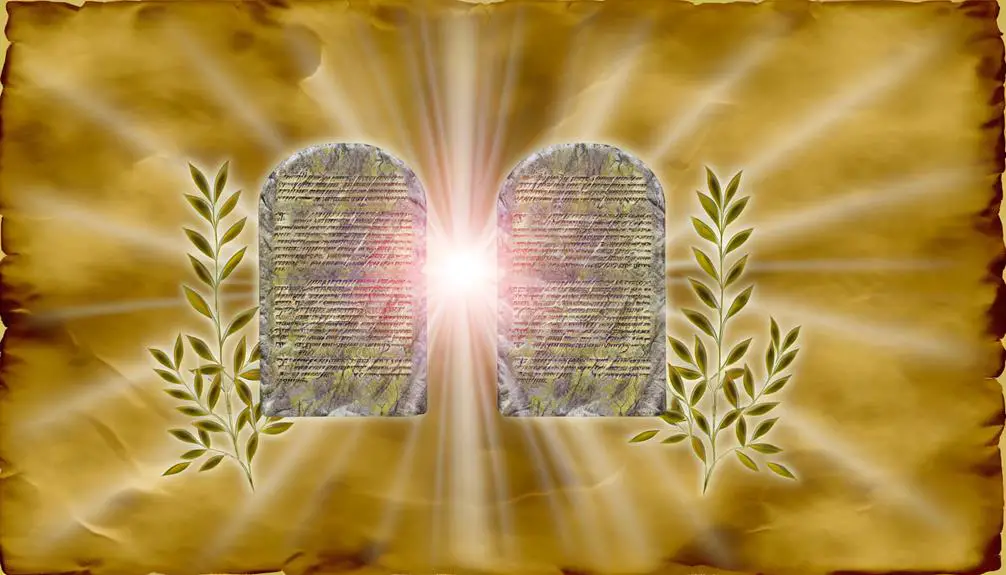Discover the profound symbolism of the number 10 in the Bible, revealing layers of divine order and completeness that beckon deeper exploration.

Meaning of the Number 10 in the Bible
Have you ever pondered the real significance behind the number 10 in the Bible? This numeral appears throughout the scriptures in contexts that suggest a deeper meaning, from the Ten Commandments to the ten plagues of Egypt. It's not just a random figure; it symbolizes completeness, divine order, and the foundation of God's law in both the physical and spiritual realms.
By exploring its biblical origins and how it intertwines with creation stories, prophecy, and rituals, you'll uncover layers of interpretation that could reshape your understanding of this seemingly simple number.
Let's embark on this journey together, and you might find these insights illuminating a path to a richer comprehension of biblical symbolism.
Key Takeaways
- The number 10 signifies completeness, divine order, and the covenant in biblical narratives.
- It embodies fundamental ethical principles through the Ten Commandments guiding human conduct.
- Tithing practices involving the number 10 symbolize worship, obedience, and dedication to God.
- Reflects divine perfection, moral completeness, and governance, enhancing understanding of theological concepts.
Biblical Origins of 10

In exploring the biblical origins of the number 10, we find its significance deeply embedded in ancient texts, reflecting a pattern of divine order and completeness. This number doesn't just appear randomly; it's often linked to critical moments of spiritual and societal covenant. The Decalogue symbolism, for instance, showcases the number 10 as foundational to the moral and ethical framework given to humanity. This isn't about the commandments themselves, which is another discussion, but rather the symbolic weight the number 10 carries in this context. It represents a totality, a complete set of principles meant to guide human conduct.
Tithing practices further illustrate the importance of the number 10 in a biblical context. Here, you're looking at a system where believers are instructed to give a tenth of their earnings or produce as a form of worship and obedience to God. This practice underscores the number 10's role in reflecting trust and reliance on divine provision. It's a tangible expression of faith, a reminder of God's sovereignty over all resources. Through tithing, the number 10 transcends its numerical value, embodying a gesture of commitment and a recognition of divine authority.
Together, Decalogue symbolism and tithing practices provide a nuanced understanding of the number 10's biblical roots. They highlight how this number serves as a bridge between the divine and the earthly, encapsulating concepts of completeness, order, and spiritual obligation. This deeper exploration into the number 10's significance reveals its intricate connection to broader themes of covenant, faith, and divine governance within the biblical narrative.
Ten Commandments Explained

Delving into the Ten Commandments, we encounter a cornerstone of biblical morality, each command serving as a fundamental principle guiding ethical conduct and fostering a direct relationship with the divine. These directives aren't merely ancient texts but are imbued with profound moral foundations that have shaped societal laws and personal ethics across centuries.
The first four commandments emphasize the importance of a singular, devout relationship with God, underscoring the prohibition of idolatry, the sanctity of God's name, and the observance of the Sabbath. These commands are pivotal in establishing a framework for worship and reverence, unique to the monotheistic tradition of the time.
Transitioning from divine to social relations, the subsequent commandments focus on the ethical treatment of fellow humans. The command to honor one's parents forms a bridge between these sections, highlighting the significance of familial bonds as a microcosm of societal harmony.
Prohibitions against murder, adultery, theft, false testimony, and covetousness serve as the bedrock for societal laws, safeguarding not only the physical and emotional well-being of individuals but also the moral integrity of the community. These commands underscore the value of human life, the sanctity of marriage, the importance of honesty, and the need for contentment with one's own possessions.
Significance in Creation Stories

Exploring the creation stories, we uncover the number 10's symbolic resonance, revealing layers of meaning that extend beyond mere numerology. The creation narrative in the Bible, particularly in the book of Genesis, presents a structured sequence of events unfolding over six days, culminating in a day of rest. This sequence establishes a divine order, setting a precedent for the significance of numerical patterns in conveying spiritual truths.
In the context of creation days, the number 10 doesn't directly appear; however, its presence is implicitly felt through the notion of completeness and divine order that the creation story embodies. The week's culmination in a Sabbath rest on the seventh day hints at a cycle of work and rest, of creation and completion, that resonates with the wholeness symbolized by the number 10.
The emphasis on divine order in the creation narrative underscores the role of numbers in the biblical text as carriers of deeper meanings. The number 10, often associated with completeness and divine perfection, can be seen as echoing the overarching theme of order and balance within the universe. This interpretation invites a re-examination of the creation story, not merely as a historical or theological account, but as a foundational text imbued with symbolic significance.
Understanding the number 10's role in the creation stories thus offers insights into the biblical worldview, where numbers aren't arbitrary but are laden with meaning, reflecting the intricacies of divine order in the cosmos. This analysis encourages a deeper appreciation of the biblical narrative's complexity, where even the underlying numerical structures serve to convey profound spiritual truths.
Ten Plagues of Egypt

Reflecting on the biblical narrative, one cannot overlook the significance of the number 10 as exemplified by the Ten Plagues of Egypt, a series of divine interventions that underscore the theme of judgment and liberation. This decalog of calamities, sent upon Egypt, served not only as a direct challenge to Pharaoh's defiance but also highlighted Moses' leadership in the liberation of the Israelites.
The plagues, starting from the Nile turning to blood to the death of the firstborn, each represent a crescendo of divine power against the stubbornness of Pharaoh and the gods of Egypt. They are a testament to the struggle between divine will and human obstinacy.
Plague |
Emotion Evoked |
|---|---|
Nile to Blood |
Horror |
Frogs |
Disgust |
Gnats |
Annoyance |
Flies |
Anguish |
Livestock Death |
Despair |
Boils |
Agony |
Hail |
Fear |
Locusts |
Hopelessness |
Darkness |
Desolation |
Firstborn Death |
Grief |
This sequence of events, culminating in the Exodus, demonstrates not just God's power but also a critical lesson in faith and leadership under Moses. It's a narrative that starkly presents the consequences of Pharaoh's defiance against the backdrop of Moses' unwavering faith and leadership. Through this lens, the Ten Plagues not only serve as a divine judgment but also as a means of liberation, marking a pivotal moment in the journey of the Israelites towards freedom.
Numerology and Theology

The significance of the number 10 in biblical narratives, as exemplified by the Ten Plagues of Egypt, invites a broader examination of numerology within theological contexts. You'll find that the Bible employs numbers not just as quantities, but as symbols carrying deeper, often divine, meanings. This practice, known as number symbolism, enriches the stories and teachings, providing layers of interpretation that extend beyond the literal.
Number 10, in particular, is frequently associated with divine perfection and completeness. This symbolism is rooted in several key biblical instances beyond the Ten Plagues, such as the Ten Commandments, which represent the fullness of God's law for humanity. It's as if through these tenets, the concept of moral and spiritual wholeness is conveyed, underscoring the number's significance in depicting divine perfection.
Engaging with numerology, you're encouraged to reflect on the intrinsic meaning behind numbers used in sacred texts. This isn't about finding hidden codes or predictions, but understanding how numbers like 10 contribute to the theological narrative. They're tools through which the biblical authors express complex concepts of divinity, order, and moral completeness in a more accessible, relatable manner.
In this context, your appreciation of biblical stories and teachings becomes richer. You're not just reading historical accounts or ethical guidelines; you're engaging with a text that uses number symbolism to weave a deeper, spiritually resonant message. This layer of meaning enhances your understanding, offering insights into how divine perfection is conceptualized and communicated within the Bible.
10 in Prophecy and Revelation

In biblical prophecy and revelation, the number 10 often emerges as a symbol of divine order and completeness, framing critical events and visions with profound theological significance. This symbolic usage underscores the meticulous structure and deep layers of meaning within the biblical texts, particularly in the prophetic books. Let's delve into how the number 10 functions in this context:
- Daniel's Visions: Daniel's apocalyptic visions are rich with symbolism, including the use of numbers. In these visions, the number 10 signifies a completeness of kingdoms or epochs. For instance, the vision of the statue in Daniel 2, with its ten toes made of iron and clay, symbolizes a series of kingdoms that will rise and fall before the establishment of an everlasting kingdom by God. This use of 10 emphasizes the completeness of human history under divine sovereignty.
- Beast's Horns: In the book of Revelation, the imagery of a beast with ten horns appears, representing ten kings or kingdoms that share authority for a brief period before succumbing to the dominion of the Lamb (Revelation 17:12-14). The ten horns signify a full measure of earthly power that ultimately proves transient in the face of divine authority.
- The Ten Days of Tribulation: Revelation 2:10 mentions a period of ten days during which believers will undergo tribulation. This period, while not necessarily literal, signifies a complete and predetermined time of testing, underscoring the notion that God's control encompasses even the trials and suffering of the faithful.
In these examples, the number 10 serves as a thematic thread that weaves through prophecy and revelation, illustrating the comprehensive governance of God over the course of human events and the ultimate triumph of divine will.
10's Role in Rituals and Ceremonies

Throughout biblical rituals and ceremonies, the number 10 frequently symbolizes a fulfillment of religious observance and divine commandments, marking its pivotal role in connecting the faithful with sacred traditions. This numeral's significance is deeply embedded in the structured practices that define and sustain the spiritual life of the community, from tithing practices to the intricacies of priestly garments.
Tithing practices, a cornerstone of biblical stewardship, revolve around the number 10, illustrating its foundational role in religious observance. You're commanded to offer a tenth of your earnings and produce, a practice that not only honors God's provision but also fosters a sense of communal support and responsibility. This act of giving a tenth, or a tithe, is more than an obligation; it's a ritual that reinforces the covenant relationship between the faithful and the divine, embedding the number 10 as a symbol of complete and total dedication to God's law.
The significance of the number 10 extends to the very garments worn by priests during sacred ceremonies. These garments, detailed in the scriptures, are meticulously designed with elements that often count to ten, symbolizing completeness, holiness, and direct service to the divine. Each aspect of these priestly garments, imbued with symbolism, reflects a deep connection to the divine commandments and the sacred role of the priests in mediating between the divine and the faithful.
Thus, in the realm of biblical rituals and ceremonies, the number 10 stands as a testament to the structured, symbolic ways through which the faithful engage with their spiritual obligations and connect with the divine. Its recurring presence underscores a theme of completeness, dedication, and divine order.
Frequently Asked Questions
How Does the Number 10 Relate to the Concept of Tithing in the Bible?
In the Bible, the number 10 is closely associated with tithing. This practice reflects the decimal system, emphasizing the importance of 10 in creating complete cycles of giving and receiving.
You're expected to give one-tenth of your earnings or crops. It's not just a random figure; it symbolizes a whole, a completion of a cycle, underscoring the act of tithing as a fundamental, structured part of spiritual and communal life.
Are There Any Lesser-Known People or Events Associated With the Number 10 in the Bible Outside of the Commonly Discussed Stories and Commandments?
You mightn't know, but beyond the Ten Commandments and tithing, the Bible references the number 10 in other significant ways.
For instance, the Ten Plagues of Egypt showcase God's power and judgment in Exodus. Additionally, the genealogies, particularly the ten generations from Adam to Noah, illustrate the passage of time and humanity's early lineage.
These examples highlight the number's importance in conveying themes of judgment, continuity, and divine intervention.
How Has the Interpretation of the Number 10's Significance Evolved in Different Christian Denominations Over Time?
You've seen how denominational differences have shaped the interpretive evolution of the number 10's significance across Christian sects. Initially, interpretations were fairly uniform, but over time, theological divergences have led to varied understandings.
Some denominations emphasize its traditional symbolic meanings, while others have adapted its significance to reflect contemporary beliefs and values, illustrating the dynamic nature of religious interpretation and the impact of cultural and theological shifts on scriptural understanding.
Are There Any Parallels or Contrasts Between the Biblical Meaning of the Number 10 and Its Significance in Other Major World Religions or Ancient Cultures?
You're diving into how the number 10 is perceived across different beliefs and ancient practices.
Interestingly, this number holds significant weight not only in biblical texts but also in Pythagorean symbolism and Mayan numerology.
In Pythagorean thought, it represents perfection and the wholeness of life. Meanwhile, the Mayans viewed it as a symbol of life and creation.
These parallels and contrasts highlight a universal reverence for the number, transcending a single cultural or religious interpretation.
How Do Biblical Scholars Reconcile Any Apparent Contradictions in the Use or Symbolism of the Number 10 Throughout the Bible?
When you're exploring how scholars tackle contradictions in the use of the number 10, it's crucial to consider the balance between numerical consistency and symbolic diversity.
They often analyze the context where the number appears, noting that while its usage remains consistent, its symbolism can shift dramatically.
This approach allows them to weave together seemingly contradictory instances, demonstrating how diverse interpretations can coexist within a coherent analytical framework.
Conclusion
In summary, the number 10 transcends mere digits, embodying a divine completeness within the biblical narrative. From the Decalogue to cosmic order, its presence weaves a tapestry of celestial intent and human responsibility.
This numerical motif, whether in the recounting of plagues or the architecture of prophecy, serves as a cornerstone, subtly guiding the faithful through the epochs.
Hence, its study offers not just numerical insight but a deeper understanding of the sacred dance between the finite and the infinite.



Sign up